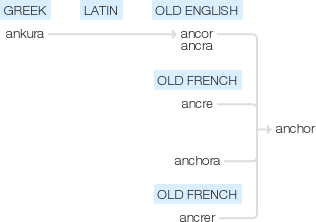Anchor
Old English ancor, ancra, via Latin from Greek ankura ; reinforced in Middle English by Old French ancre . The current form is from anchora, an erroneous Latin spelling. The verb (from Old French ancrer ) dates from Middle English.
wiktionary
From Middle English anker, from Old English ancor, ancra, from Latin ancora, from (or cognate with) Ancient Greek ἄγκυρα(ánkura). The modern spelling is a sixteenth-century modification to better represent the Latin spelling anchora, a variant of the older Latin spelling ancora.
From Middle English anchoren, ankeren, either from the noun or perhaps (via Old French ancrer) [1] from a Medieval Latin verb ancorare, from the same Latin word ancora.
Alternative forms.
etymonline
anchor (n.)
"device for securing ships to the ground under the water by means of cables," Old English ancor, borrowed 9c. from Latin ancora "an anchor," from or cognate with Greek ankyra "an anchor, a hook," from PIE root *ang-/*ank- "to bend" (see angle (n.)).
A very early borrowing into English and said to be the only Latin nautical term used in the Germanic languages (German Anker, Swedish ankar, etc.). The unetymological -ch- emerged late 16c., a pedantic imitation of a corrupt spelling of the Latin word. The figurative sense of "that which gives stability or security" is from late 14c. Meaning "host or presenter of a TV or radio program" is from 1965, short for anchorman (q.v.).
anchor (v.)
"fix or secure in a particular place," c. 1200, perhaps in Old English, from anchor (n.) or from Medieval Latin ancorare. Figurative use from 1580s; in reference to television or radio programs, 1961. Related: Anchored; anchoring.
